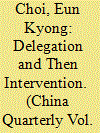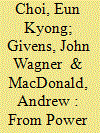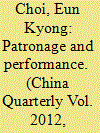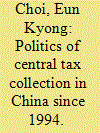| Srl | Item |
| 1 |
ID:
159826


|
|
|
|
|
| Summary/Abstract |
This article reviews the decision-making process behind the creation of a new rural pension between the early 2000s and 2009. It finds that although policymaking was initially delegated to the bureaucratic level and hence involved a protracted bureaucratic struggle, the issue was resolved by a fiat imposed by top leaders rather than by bureaucratic compromise as a bureaucratic politics model would suggest. I call this policymaking process “delegation and then intervention.” Although the Ministry of Labour and Social Security (MOLSS) persistently argued in favour of creating the new rural pension, the Ministry of Finance obstinately objected to it. This study finds that when bureaucratic organizations are in conflict because of their core beliefs, rather than resource allocation, they are less likely to reach a consensus. Faced with a prolonged bureaucratic deadlock, top leaders decided in favour of the MOLSS policy initiative, thereby adopting a progressive measure that would provide a completely subsidized basic pension for the rural elderly.
|
|
|
|
|
|
|
|
|
|
|
|
|
|
|
|
| 2 |
ID:
183231


|
|
|
|
|
| Summary/Abstract |
Many China watchers argue that Xi Jinping has concentrated power in his own hands in a manner unprecedented since the death of Mao Zedong and Deng Xiaoping. This article tests the extent of Xi's power consolidation by comparing the strength of his faction during his time in power to similar periods under his two immediate predecessors, Jiang Zemin and Hu Jintao. Furthermore, we investigate whether a dominant faction is emerging under Xi Jinping, replacing the power balancing between factions that was the norm throughout the reform era. Analysing factional affiliations of Chinese leaders in the top four ranks, we find that Xi has formed a dominant faction. Through statistical analysis of the promotion chances of provincial leaders, we find that Xi has been unusually successful when compared to previous leaders at promoting his clients. This suggests that Xi has boosted the power of his faction by elevating provincial leaders to an extent not seen since the death of Mao and Deng.
|
|
|
|
|
|
|
|
|
|
|
|
|
|
|
|
| 3 |
ID:
092515


|
|
|
| 4 |
ID:
116488


|
|
|
|
|
| Publication |
2012.
|
| Summary/Abstract |
This paper attempts to estimate the impact of both factional ties and economic performance on the promotion of provincial Party secretaries and governors by analysing a person-year dataset of their career mobility for inclusive years 1989 to 2009. We found that for provincial Party secretaries whose promotion meant rising to a top national position, both factional ties and good economic performance increased their chance for promotion. On the other hand, for provincial governors whose promotion meant rising to a ministry-level position, only economic performance mattered for their promotion. Among provincial Party secretaries, the extent to which performance affected the likelihood of promotion was not different between factional members and non-members. This suggests that even factional members needed to show good performance to enhance the likelihood of their promotion.
|
|
|
|
|
|
|
|
|
|
|
|
|
|
|
|
| 5 |
ID:
143777


|
|
|
|
|
| Summary/Abstract |
The central leaders in China adopted a tax assignment system and centralized taxation in 1994 with the goal of increasing central tax revenues. By setting up the National Tax Bureau, the central leaders intended to leave central tax collection undisturbed by local influences. However, informal practices at the local level revealed that the local governments colluded with the central tax bureaucrats stationed in their regions at the expense of central interests. The need to develop local economies, an important task assigned to local governments, is one important reason behind local interference in central tax collection. This study finds that the central government coped with this problem by changing the incentives of the provincial party secretaries through linking central tax collection in a jurisdiction with their chance of promotion.
|
|
|
|
|
|
|
|
|
|
|
|
|
|
|
|
| 6 |
ID:
093851


|
|
|
| 7 |
ID:
175621


|
|
|
|
|
| Summary/Abstract |
Developed countries are becoming concerned with an increase in temporary workers, as it has undermined both their job security and the effects of collective action. China has experienced a surge of temporary work during the last three decades. Employing a cost and benefit analysis, this study identifies labor shortages and the weakness of job protection against arbitrary dismissal, both preconditions that have affected the collective-action preferences of temporary and permanent workers in China since 2010. Although the former has lowered the cost of collective action for temporary workers in China, the latter has increased the opportunity cost for permanent workers. Analyzing the Chinese General Social Survey in 2013, this study finds that temporary workers are twice as likely as permanent workers to actively join in collective action, suggesting that the prevalence of precarious work in China does not necessarily disempower Chinese workers.
|
|
|
|
|
|
|
|
|
|
|
|
|
|
|
|